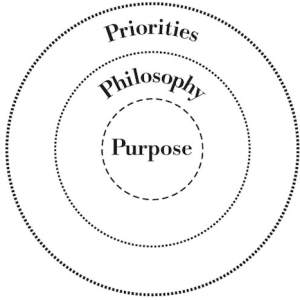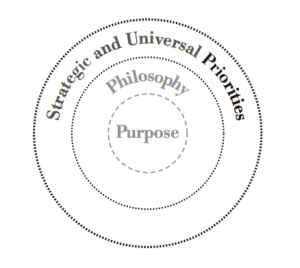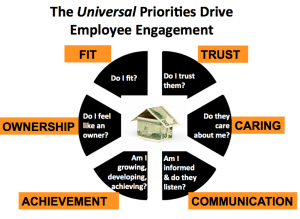Sexual harassment and workplace culture: Does your workplace allow this behavior?
There has been a lot of conversation recently about sexual harassment and workplace culture. Why does sexual harassment exist in a workplace? What is missing in the culture that allows such behavior to thrive?
To understand this, look deep inside the culture of your organization. Look at its core. There you will find the Purpose, Philosophy, and Priorities. They are the guideposts for your organization and for everyone who works there. They can provide clues to the type of behavior a company allows.

Sexual harassment and workplace culture: Look at your organization’s Purpose
The Purpose of your organization is typically not the root of sexual harassment behavior. Although this would be less common, a company could exist for the purpose of nurturing inequality, discrimination, or other negative behavior. In an organization with such a Purpose, sexual harassment behavior might be a natural reflection of that Purpose.
Typically, companies are rooted in a Purpose that is a contribution to society. Less frequently are companies created to nurture deviant behavior.
Sexual harassment and workplace culture: Look at your organization’s values
Look at its core values
So, if you find that your organization’s Purpose is not a source for sexual harassment, then you must investigate your organization’s values. What are the principles and values that are core to how the organization does its work?
There are a variety of values that are core to a company’s culture. There are distinctive values, strategic values, and universal values.
Look at its Philosophy
Distinctive values—which I call the organization’s Philosophy—are the core values that have been central to the culture since its founding. They characterize the character of the organization. These values are usually derived from the founder, and if these values changed, the organization might feel like a different company.
So, could the organization’s distinctive values be the basis for allowing sexual harassment behavior? You only have to look to comments made about Uber in early 2017 to see that the culture was a male dominant one that focused on winning. Many described these distinctive values—aggressive, unrestrained, dishonest—a set of values that could support rather than deter sexual harassment. In this organization, the distinctive values served as the source for inappropriate behavior. The values supported it. Bad behavior aligned with the organization’s values.
Other organizations may similarly have distinctive values that permit bad behavior. Unless these distinctive values change, there should be no surprise that employee behavior aligns with those values. Companies typically hire people because they are a fit.
Changing the distinctive values of an organization are hard to do because they are a reflection of the founder or leader. Therefore, the values have been central to the organization’s culture over the years. Rarely will behavior change unless new leadership is brought in with values inconsistent with values that nurture sexual harassment. This is not an easy fix. It takes time because the company selected employees who fit that culture.
Look at its Priorities
But let’s say that the Purpose of your organization is a contribution to society and your distinctive values would in no way support sexual harassment. Then continue to look further at the company’s Priorities.

Strategic and Universal Priorities
Priorities are the values that are either strategic or universal.
Strategic Priorities
Strategic Priorities are the values that guide an organization in achieving its goals. To clarify, they are external, and customer and market focused. Take the time to look at your organization’s strategy to ensure that your goals and the aligned strategic Priorities won’t directly or indirectly support a workplace that nurtures this behavior. Many suggest that Fox News had a prime desire to increase revenue and thus tolerated sexual harassment.
Universal Priorities
Universal Priorities are values that are internal and employee focused. They guide an organization in building a more engaged workplace.
The universal Priorities impact the climate of the organization. Universal Priorities include fit, trust, caring, communication, achievement, and ownership. In some organizations, the Purpose, the distinctive Philosophy, and the strategic Priorities would not indicate a culture that supports sexual harassment. But the climate of the organization either lacks trust, is unfair, or is not open. Deficiencies in one or more of the universal Priorities can lead to poor behavior and an unsafe workplace.

In an organization with low trust in leaders, there can be feelings that individuals are dishonest, lack integrity, are disrespectful, or are unfair. The leaders may be competent in skills that put them in their position, but they may view the world in a way that does not support a healthy workplace. If those internal, universal Priorities centralize power and control, and create a culture that allows intimidation and the use of fear, then problems will emerge. If the company does not value openness and individuals do not feel like they have a voice, then there may be limited opportunity to expose poor behavior. The negative environment can be isolated to particular individuals or departments, or it could be a broader dysfunction.
Define and talk about the core culture
Organizations must be self-reflective. They must look at their Purpose and their values—both expressed and lived. If culture is not an ongoing part of the conversation, too often behavior strays based on individual personalities or on a larger scale because the culture supports it.
Managing one’s culture and creating a humane workplace that nurtures the best in each of its employees is a goal for all. Sexual harassment is a byproduct of the workplace culture. Understanding the importance of values—defining them, talking about them, and living them—is key to building a workplace where everyone thrives.
Contact Sheila
 Have any questions? Contact Sheila for information on her organizational culture, change, and employee engagement services. Her management consulting firm Workplace Culture Institute is based in Atlanta, serving clients globally.
Have any questions? Contact Sheila for information on her organizational culture, change, and employee engagement services. Her management consulting firm Workplace Culture Institute is based in Atlanta, serving clients globally.
Use the Contact Form to email Sheila.
This site uses Akismet to reduce spam. Learn how your comment data is processed.
Leave a Reply